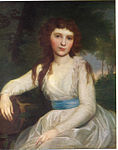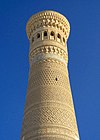Museum Of Arts Of Uzbekistan
History
The museum was established in 1918 and was located in former palace of Grand Duke Nicholas Konstantinovich of Russia, a grandson of Tsar Nicholas I of Russia, until 1935. It was moved to the People's House in 1935. In 1974, the People's House building was demolished and replaced by the current building.
Building



During the Stalinist era (1927–1953), three Soviet architects, Abdulov, Nikiforov, and Rosenblum designed the new building in the form of a huge cube, with all sides separated into even metal squares, lined with aluminum sheets on the outside. The lower part of the building and the entrance are decorated with polished gray marble. The upper part is glazed with chrom-brugnatellite, smoothing the sunlight and setting indoor matte illumination.
Collection
The initial collection of the museum consisted of a hundred works of art from Grand Duke Nicholas Konstantinovich of Russia and other private collections, nationalized in April 1918. Those were mostly paintings and drawings by Russian and Western European masters, sculptures, furniture, and porcelain. Immediately after establishing the museum, its collection was enlarged with works from the collection of the Turkestan local history museum.
Some works were transferred from museum collections in Moscow and Leningrad—for example, in 1920–1924 the museum received 116 works of Ukrainian and Russian artists from the 18th to 20th centuries, among them portraits by Vladimir Borovikovsky, Karl Bryullov, Ilya Repin, Vasily Tropinin, Nikolai Yaroshenko, and many others. The museum also purchased about 250 paintings of pre-revolutionary Russian and non-Russian artists who were active in Central Asia: Igor Kazakov, Nikolay Karazin, and William Sommer. From the second half of the 1930s, the museum's collection was expanded mostly with works by Uzbek artists, including works of Usto Mumin, Pavel Benkov, and Leo Bure.
In addition to its permanent collection, the museum holds exhibitions of Uzbek and international artists. Collections in the museum are divided into four departments: National applied art of Uzbekistan, Fine arts of Uzbekistan, Russian and Western art, and Far Eastern art.
Controversy
The museum's chief curator, Mirfayz Usmonov, was caught in 2014 selling artworks in the black market for the past 15 years and replacing them with copies. He was prosecuted and sentenced to nine years in jail. Two other museum employees were sentenced to eight years each.
Gallery
-
Andrei Belloli, Bather (before 1881)
-
Dmitry Levitsky, Portrait of A. Voronzova (1761–1784) (1780s)
-
Nikolay Karazin, Falcon hunt (before 1908)
-
David Teniers the Younger, Monkey barbers (1659)
-
Vladimir Borovikovsky, Portrait of A. Volkonsky (before 1825)
-
Vasily Tropinin, Portrait of A. Obolensky (1845)
-
Nikolay Yaroshenko, Expulsion (1883)
-
Cornelis Saftleven, Peasantry (17th century)
References
- ^ "Fine Arts Museum of Uzbekistan - Lonely Planet". lonelyplanet.com. Retrieved 2 December 2015.
- ^ "EMBASSY OF THE REPUBLIC OF UZBEKISTAN TO THE UNITED KINGDOM OF GREAT BRITAIN AND NORTHERN IRELAND". uzbekembassy.org. Archived from the original on 21 February 2017. Retrieved 2 December 2015.
- ^ "» Государственный музей искусств Узбекистана в Ташкенте ожидает реконструкция". museumstan.com. Archived from the original on 8 December 2015. Retrieved 2 December 2015.
- ^ "Museum of Fine Arts » Arts & Culture, Museums, Tashkent » VisitUzbekistan.travel". visituzbekistan.travel. Archived from the original on 8 October 2016. Retrieved 2 December 2015.
- ^ "The State Art Museum of Uzbekistan: description, photos, contacts". advantour.com. Retrieved 2 December 2015.
- ^ "Художественный музей в Ташкенте и коллекция русского искусства | Письма о Ташкенте". mytashkent.uz. Retrieved 2 December 2015.
- ^ "State Art Museum of Uzbekistan". stateartmuseum.uz. Retrieved 2 December 2015.
- ^ "Государственный музей искусств Узбекистана". stateartmuseum.uz. Retrieved 2 December 2015.
- ^ "Uzbek museum sold off artworks over 15 years and replaced them with copies". The Guardian. 12 December 2014. Retrieved 29 November 2015.








